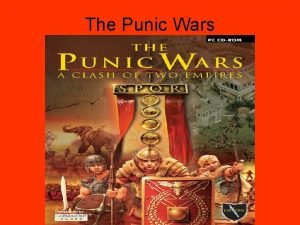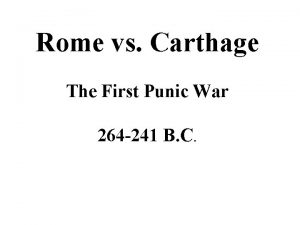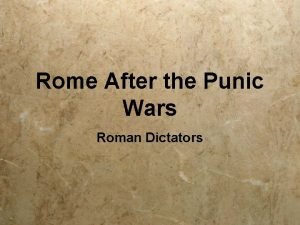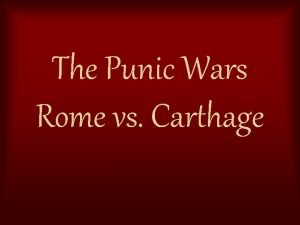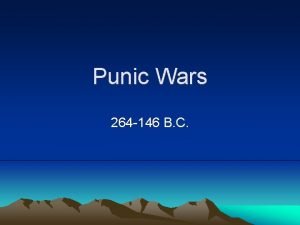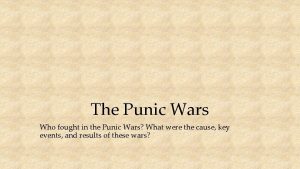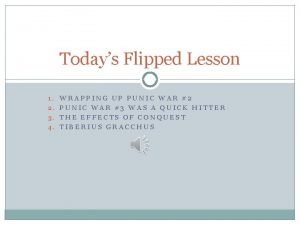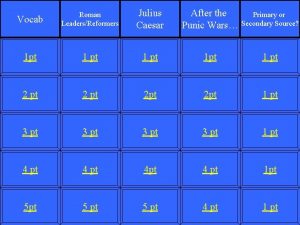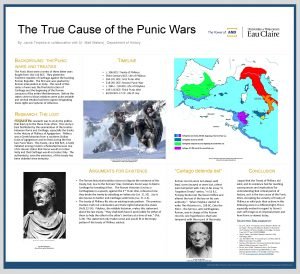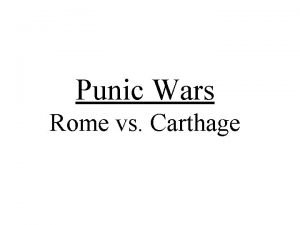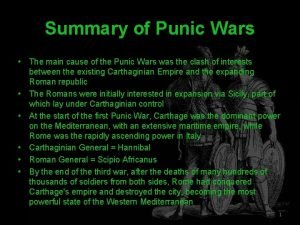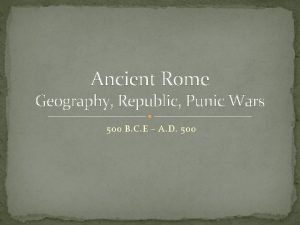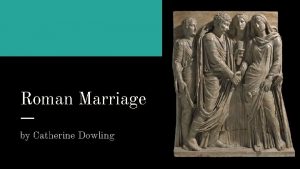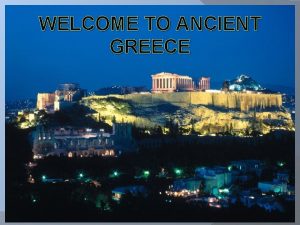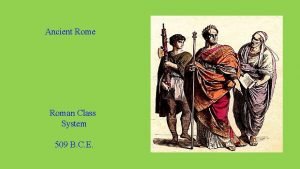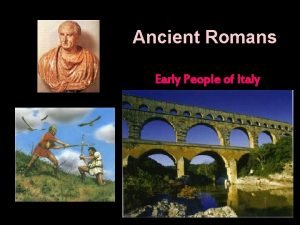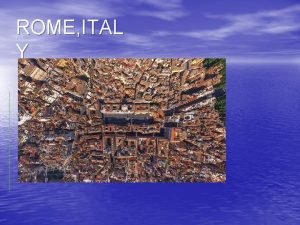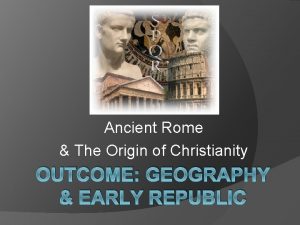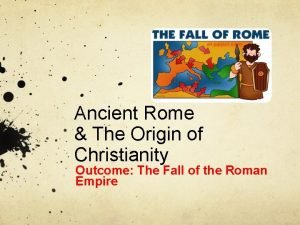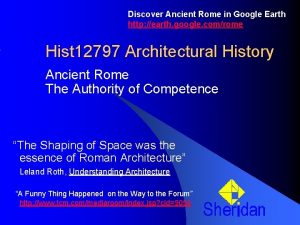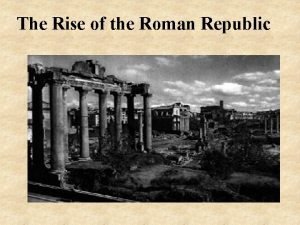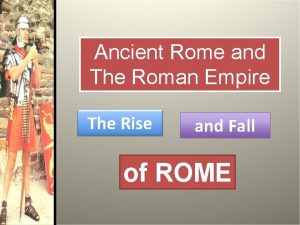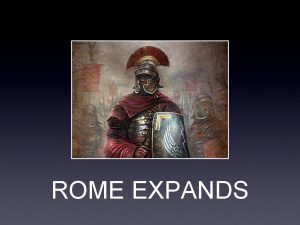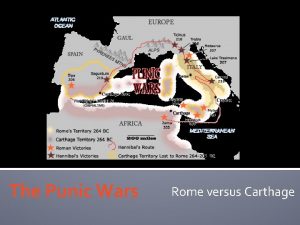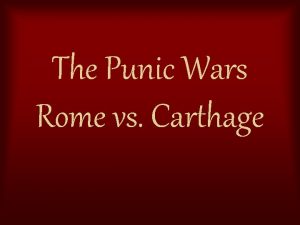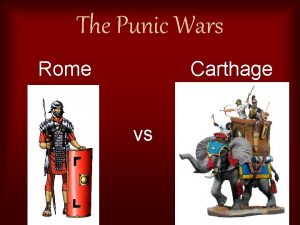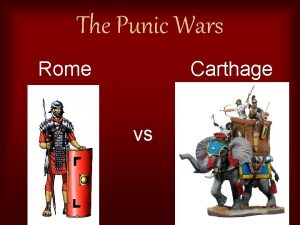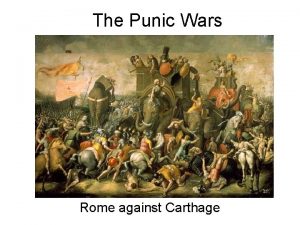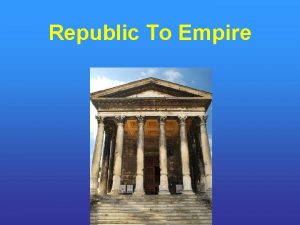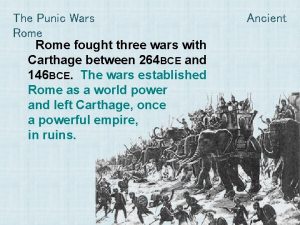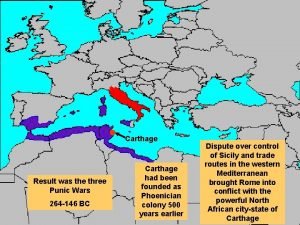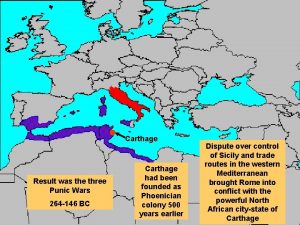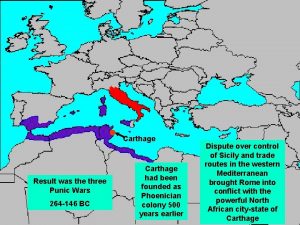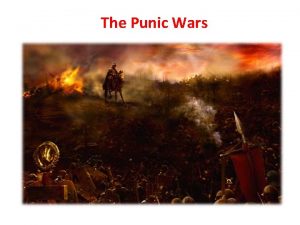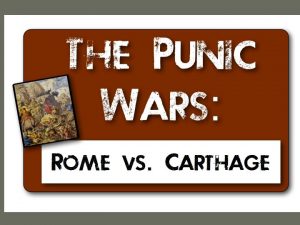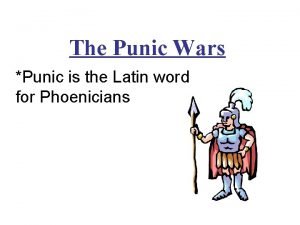Welcome to Ancient Rome Punic Wars Carthage vs





























- Slides: 29

Welcome to Ancient Rome

Punic Wars • Carthage vs. Rome • War starts in 264 BC • 1 st Punic War • Fought for control of Sicily • Lasted 23 years (264 -241 BC) http: //www. youtube. com/watch? v=dxb. Wtz. COxv 8 • Carthage is defeated

Punic Wars • 2 nd Punic War • Leads army of 50, 000 infantrymen, 9, 000 cavalry and 60 elephants • Moved through Spain, France (Gaul) and the Alps to attack Rome

Punic Wars • 3 rd Punic War • Hannibal no longer a threat • 149 BCRomans invade Carthage • 146 BCCarthage defeated

The Fall of the Roman Republic • Big gap between the rich and poor • Slaves make up 1/3 of the Roman population

Republic Collapses • Gracchus Brothers • Julius Caesar

Julius Caesar • Created jobs • Gave citizenship • Expanded the Senate • New calendar

Death of Julius Caesar • March 15, 44 BC, the “Ides of March” • A group of Senators, led by Marcus Brutus and Gaius Cassius stab Caesar to death in the Senate chamber • Et tu, Brute? • His death ends the Roman Republic Ides of March Video

Power Struggle after Caesar • Civil War breaks out Dies • Caesar supporters vs. his murderers • Octavian- Caesar’s adopted sonforms Second Triumvirate in 43 BC • Fighting ends the Second Triumvirate • Accepted the title of Augustus • Means “Exalted One”

A Vast and Powerful Empire • 90% of people engaged in farming • Trade around the Mediterranean Sea and with China and India • Silk roads from China • Pax Romana

Life in Rome • Education • Only for upper-class boys • Until age 16 • Girls married off at age 12 -15 • Poor children had to work

Life in Rome • Slaves • Had no legal rights • Strong, healthy males sometimes forced to become Gladiators • More than 1 million slaves lost their lives trying to gain freedom

Life in Rome • Religion • Adoption of Greek deities • Became symbols of the government • Worship of the emperor- part of the official religion of Rome

Life in Rome • Celebrations • Way of controlling the poor • Government gave out daily rations of grain • 150 holidays a year • Used to distract and control the masses

Life in Rome • The Roman Colosseum • Held 50, 000 people • Built between 70 -80 AD • Rich and poor gathered to watch the Gladiators fight • Gladiators often fought to the death with each other and with wild animals

The Decline of the Roman Empire • Trade is disrupted • Wars are costly • Waste of money on luxury goods • Government raises taxes • Inflation- drop in value of money and rise in prices

The Decline of the Roman Empire • Soil overworked= no longer fertile • Food shortage • Disease spreads • Population decline

The Decline of the Roman Empire • Loyalty to the empire decreases • Germanic tribes invade northern territories • Barbarians- Non-Romans • Army loyalty collapses • Mercenaries- foreign soldiers who fight for money • Only the army was active in politics • No longer an honor

The Empire Splits • Diocletian • 284 - becomes emperor and restores order • Doubles the size of the army • Uses mercenaries and prisoners of war • Persecutes Christians

The Empire Splits • Divides the Empire • East- Greek speaking (Greece, Anatolia, Syria and Egypt) • West- Latin speaking (Italy, Gaul, Britannia, Spain) • Diocletian controls the East • General Maximian controls the West • Diocletian retires in 305, civil war breaks out

The Empire Splits • 312 - Constantine takes control of the Eastern Empire • 324 - takes control of the West • 330 - Moves capital to Byzantium, Anatolia • City renamed Constantinople • Bosporus Strait

Collapse of the Empire • Attila the Hun • United the Huns in 444 • Had 100, 000 soldiers • Attacked both East and West Roman Empires • Disease and famine deplete is forces • Pope Leo I negotiated the Hun withdrawal from Rome

Collapse of the Empire • Military • Political • Economic • Social

Greco-Roman Civilization • Stoicism- very influential • Virgil- wrote “Aeneid, ” most famous piece of Latin literature • Styled after Homer

Greco-Roman Civilization • Art • “Bas-relief” or “low-relief” • Images projected from a flat background

Greco-Roman Civilization • “Mosaics”- pictures or designs made by setting small pieces of stone, glass or tile into a surface

Thank You Rome • Architecture • Arches, domes, aqueducts, columns • Thomas Jefferson- 1700’s • Roman revival in the US • US Capital, state capitals, buildings • Roads made of concrete, stone, sand

Thank You Rome • Language • Latin developed into Spanish, Portuguese, Italian, French, Romanian • “Romantic Languages” • Common Roman heritage • Half of the words in English have a basis in Latin

Thank You Rome • Laws should be fair and apply equally to everyone • Principles of Roman Law: • All people had the right to equal treatment under the law • A person was considered innocent until proven guilty • The burden of proof rested with the accuser rather than the accused • A person should be punished only for actions, not thoughts • Any law that seemed unreasonable or grossly unfair could be set aside • Became the basis for legal systems in European countries and the United States
 Who fought in the punic wars
Who fought in the punic wars Rome vs carthage
Rome vs carthage Rome after the punic wars
Rome after the punic wars In the punic wars rome fought against
In the punic wars rome fought against Rome vs carthage
Rome vs carthage Effects of the punic wars
Effects of the punic wars The punic wars worksheet answer key
The punic wars worksheet answer key Causes of the punic wars
Causes of the punic wars Punic wars who fought
Punic wars who fought Tiberius punic wars
Tiberius punic wars Punic wars def
Punic wars def Ides of march punic wars
Ides of march punic wars Causes of the punic wars
Causes of the punic wars Punic wars notes
Punic wars notes Punic reforms
Punic reforms Helen mar kimball
Helen mar kimball Ancient rome geography
Ancient rome geography Carthage
Carthage Dowry ancient rome
Dowry ancient rome Abcs of greece
Abcs of greece Roman social classes
Roman social classes Assembly ancient rome
Assembly ancient rome Physical geography of rome
Physical geography of rome Ancient rome outcomes geography and early republic
Ancient rome outcomes geography and early republic Ancient rome and the origins of christianity
Ancient rome and the origins of christianity Byzantine empire facts
Byzantine empire facts Ave magister
Ave magister Ancient rome google earth
Ancient rome google earth Patricians ancient rome
Patricians ancient rome Roman road
Roman road
